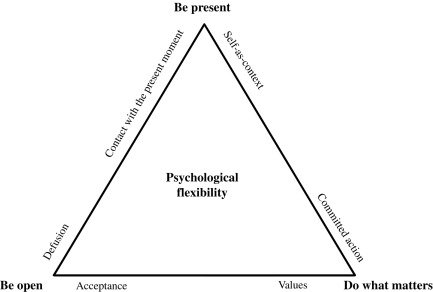What Is Acceptance And Commitment Therapy?
Acceptance and commitment therapy (ACT) is a type of cognitive therapy that uses mindfulness and acceptance strategies as well as key behaviour-change methods to help individuals to develop psychological flexibility. Acceptance and commitment therapy can be used in anxiety counselling and depression counselling. It can also be used in counselling for trauma.
Acceptance and commitment therapy can be treatment for mental health conditions such as:
Depression
Anxiety
Stress
Mental exhaustion
Obsessive Compulsive Disorder (OCD)
Post Traumatic Stress Disorder (PTSD)
Chronic pain
Borderline Personality Disorder (BPD)
Chronic grief
What Is Psychological Flexibility?
Psychological flexibility is the ability to accept and adapt to challenging feelings, thoughts, and situations as well as behaving according to their own personal values.
When an individual has low psychological flexibility, they are more likely to experience detrimental long term influences on both their mental and physical wellbeing such as:
Lower levels of work productivity and performance
Maladaptive interpersonal relationship patterns
Rigidity in thinking
Inability to concentrate
Increased likelihood of substance abuse
Lower quality of life
What Are The Benefits Of Acceptance And Commitment therapy?
Acceptance and commitment therapy helps people live richer and more fulfilling lives rather than focusing on symptom or symptom reduction. The 6 core principles improves psychological flexibility which enables people to respond to difficult situations they may be facing. Acceptance and commitment therapy helps people acknowledge their personal values and the essential notion that negative experiences are a part of life.
What Are The 6 Core Principles Of Acceptance And Commitment Therapy?
Acceptance and commitment therapy is based on 6 core principles:
Acceptance occurs when the individual enables unwanted experiences, thoughts, and feelings to come and go without feeling the need to combat them.
Cognitive defusion include implementing key learning strategies that subside the habit of concretising emotions, memories, and past experiences.
Contact with the present moment relates to being entirely aware of the here and now, with the aims of having all five senses being focused on the present.
Self-as-context refers to the continuous process of evaluating one self from the perspective that the individual is not the content, but the one experiencing it. This enables the person to be aware of one’s own experiences, emotions, and thoughts without attachment to them.
Values involve identifying what is important to the individual and what guides and drives their behaviour.
Committed action relates to setting small goals and making minuscule yet important decisions according to the individual’s personal values to create meaningful patterns.
Conclusion
Negative changes in life can detrimentally affect our mental and physical wellbeing. Acceptance and commitment therapy aims to improve your ability to manage and accept these changes, and learn how to create patterns based on personal values that allow you to be present and have a meaningful life.
If you are feeling overwhelmed, in need of advice, or need to talk to a psychologist in Melbourne, contact us or visit our site for more information.

